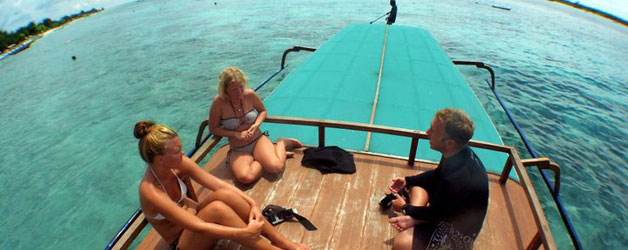Pick up any diving magazine or surf the web for dive related websites, and you’ll find lots of images taken in exotic destinations combined with interactions with aquatic life. In certain people, this often stimulates the dream of working full time as a dive professional.
There are few professions in the world where you can spend a Monday morning commuting to your work place on a boat, enjoying beautiful weather with customers who admire you for the job you do.
You’ll never forget your first breath
Most divers never forget their first breath underwater during their initial confined water training. For the majority of scuba participants, the entry level certification opens a whole new world. For some, it creates the dream and goal of becoming a scuba diving professional.
Build your self esteem
Scuba diving is a sport that builds self esteem and improves physical fitness. It also creates an environmental awareness and shows individuals how to make a positive contribution to the aquatic world.
Unlike many other sports, scuba diving is non-contact, three-dimensional and multi sensory. The competition is with each individual to better themselves as a diver, not over others. Whilst many divers enjoy the silence and serenity of the underwater world, scuba diving is also a very social activity and fosters camaraderie amongst participants and leads to lifelong friendships.
You’ll make a positive difference
As a scuba diving professional, you get to make a positive difference to other people’s lives and to the environment. Whether an individual seeks scuba instruction to learn about the environment, as a self fulfilment goal or to challenge themselves, you become a facilitator and help them dive safely and have enjoyable experiences.
The PADI system of education
The PADI system of diver education has some of the most comprehensive educational products. It’s a system that enables the instructor to work more on individualized instruction as most students are free to learn at their own pace.
This allows for you as the instructor to focus on individual needs, remediation and delivering the course in a fun and effective manner.
These materials can be used anywhere in the world to teach a standardized course. However, the instructor will need to adapt each course to the local environment and culture, which is something you will be taught to do.
Work wherever you choose
PADI instructors can choose to work part or full time in tropical resorts or local dive centres. Many instructors also have their own full time jobs and work in their spare time or weekends as either freelance instructors or through a local PADI dive centre.
In the resort environment many instructors enjoy teaching on tropical islands in warm waters on beautiful coral reefs with an abundance of fish and other aquatic life. It’s obviously this dream lifestyle that motivates many individuals to switch careers.
Join the tribe – become a PADI Divemaster
There are different methods of completing the Divemaster course; it can be done through a local dive centre, on a part time basis, either interning on classes or via practical simulated training components. Many candidates choose to take time out and intern on a program over several weeks in the tropics, and get real world hands on exposure whilst training.
Take the plunge – become a PADI Instructor
The next step after the PADI Divemaster course is to enrol in either the PADI Assistant Instructor course, or the complete PADI Instructor Development Course.
To have the best chances of employment within the dive industry, and to make a reasonable pay, then the instructor rating is a logical progression after the Divemaster course.
What you can teach
As a PADI Open Water Scuba Instructor, you can conduct introductory programs such as Discover Snorkelling and Discover Scuba Diving, and certification courses from the PADI Open Water Diver, PADI Advanced Open Water Diver, PADI Rescue Diver and the PADI Divemaster course.
It is also possible to teach specialty classes such as Enriched Air/Nitrox, Digital Photography, Deep, Wreck or Fish Identification upon taking a specialty instructor class or with sufficient experience.
Sounds amazing! What’s the catch?
PADI instructors seem to have the dream job. They get to work in exotic locations, they dive for a living, they interact with nature, and their students look up to them like heroes. In addition, they get paid for all this.
But teaching requires a special set of skills including patience, adaptability, open mindedness and basic business principles in customer service and marketing.
Often, the job of a PADI Divemaster or instructor has long hours. It can require the person to truly multitask and there may be significant periods without days off.
However if you talk to an instructor at the end of a bad days work, the majority would not swap it for anything else in the world.
It’s not all about the money, money, money
Whilst the job may not have the highest pay scales and most instructors do not work solely for money, the pay can be enough to allow good savings after a season. This could be used to finance a flight to the next destination, purchase new equipment and reinvest in additional training, or simply to bank.
If wealth could be measured in job satisfaction, then PADI instructors would probably be the wealthiest professionals on the planet, and with a life they could look back on with the biggest of smiles.
Branch out and discover new avenues
Many instructors work for a period of a few years teaching recreational classes then advance into more senior positions.
Friends who I have worked with now hold prominent positions in the scuba diving industry – from working as PADI Regional Managers, to owners of live boards, to PADI Course Directors. Others own or manage dive centres and resorts, and some specialize in technical diving and exploration.
When I think back to the career path I had originally chosen, in international financial institutions, I never for one day regret my choice – where it has taken me, the people I have met, and the memories I have.

